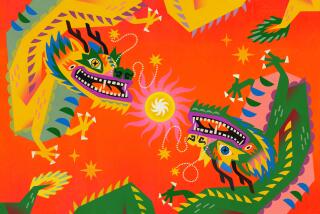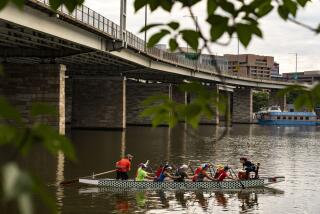Culture : Colorful Dragon Boat Festival Is Ancient Chinese Poet’s Legacy : Legend has it that Qu Yuan’s suicide gave rise to the event, which features races and rice dumplings.
- Share via
BEIJING — Qu Yuan, a poet and exiled statesman, was in despair.
The powerful army of Qin had attacked the capital of his motherland, the state of Chu. Qu had long but unsuccessfully warned Chu’s king against just such an event. Now, all was lost.
Clutching a heavy rock in both hands, Qu plunged into the Miluo River, in present-day Hunan province, according to the legend of his death.
News of his suicide spread like wildfire, and nearby villagers paddled their boats furiously along the river, searching for the poet. Some scattered steamed dumplings on the water to prevent the fish from eating his body.
Thus was born, about 278 BC, one of China’s most spectacular customs: the Dragon Boat Festival. It is celebrated with the greatest verve in regions south of the Yangtze River, especially in its birthplace of Hunan. Key features of the festival are colorful races and the preparation of zongzi, a special kind of steamed glutinous rice dumplings wrapped in leaves of bamboo or reeds.
The festival itself, when families gather to eat zongzi, officially comes on the fifth day of the fifth lunar month, which fell on June 16 this year. But boat races are held all over China and in overseas Chinese communities during the weeks around that date.
The contests are essentially a form of crew racing on long dragon-headed boats. While racers are enthusiastic for victory, most teams are made up of friends or work associates who participate for fun more than glory. Collisions and capsizings often are part of the show.
“We were no good,” confessed one of the losing racers in a competition held on Kunming Lake at the old Imperial Summer Palace in Beijing. “We were just a bunch of friends who thought it would be fun to race.” The winners of that race were a team of athletes from the State Sports Commission.
A Hunan woman, who grew up in a family that considers the Dragon Boat Festival a major seasonal event, said she felt that “making the zongzi is the most important part of the day.”
“First you must buy soda ash and reeds, then soak the reeds in the alkaline water to make them a little yellow. When I was small, the flavor of the rice and the leaves was so strong, so good. Beijing zongzi from the state stores have no taste. They only taste like the red beans or the meat that is stuffed inside them.
“In Hunan, we ate zongzi all day. They are a whole meal. Each year’s festival, we started a few days early, buying the vegetables and the rice. Now (in Beijing), my father still goes out to buy food for the day’s big meal, but mostly we eat a variety of dishes and buy the zongzi outside.”
A Beijing calligraphy teacher, who grew up in north-central China’s Shanxi province, also recalled making zongzi when he was young. But the day is not very important for most people in Beijing, he said. The capital, he complained, simply doesn’t have an environment that really supports this kind of festival.
The situation is different in Hunan and other parts of South China.
The town of Yueyang, on the Miluo River in which Qu drowned himself, held its first International Dragon Boat Festival this year, which included a zongzi competition featuring 60 varieties of the dumplings.
“The three-day competition awarded quality prizes to 16 varieties, wrapping prizes to eight varieties and organization prizes to seven producers,” the official New China News Agency reported.
Business fairs are also held in various southern cities in connection with the races, taking advantage of the habit of many Chinese from Hong Kong and Taiwan to return to their ancestral hometowns for the traditional festival.
Business transactions at Yueyang’s festival were valued at $155 million, and contracts were signed for seven economic or technological cooperation projects involving $8.5 million of overseas investment, the Chinese news agency reported.
The Sichuan province town of Leshan also held a five-day international Dragon Boat Fair, which attracted about 1 million visitors, the official news agency said. Transactions valued at $250 million were concluded.
During the three-day Dragon Boat Festival holiday weekend, more than 316,000 people left Hong Kong by train or airplane, according to Hong Kong government statistics. But Hong Kong residents don’t need to visit China to enjoy the festivities. Dragon boat racing is big in the British colony too, where races were held this year in at least six locations.
Some scholars say the historic roots of the festival actually predate Qu’s death. Ancient peoples of areas near the mouth of the Yangtze River are said to have worshiped the dragon, and to have offered sacrifices to this tribal totem on the fifth day of the fifth lunar month. In some places, rainwater collected on this day was said to be holy water spread by the heavenly dragon, and therefore to have the power to prevent diseases.
While no one can say whether Qu’s death really occurred on the day set aside to honor him, there is no doubt that he is a historical figure.
Qu has been respected as a patriot who advocated wise policies, fought corruption and cared about the people of his country. As such, he has been a symbol that has reverberated through the ages and still has strength today.
The Hong Kong Standard recently ran a cartoon showing China’s hard-line Premier Li Peng and senior leader Deng Xiaoping sweating furiously as they paddle in a dragon boat race. Li complains that the Dragon Boat Festival is all because of “an ancient dissident” who “didn’t get his wish” and therefore “threw himself into a river and drowned before the pollution got him.”
“It wouldn’t happen in New China: All the dissidents are safe in jail,” Li declares to Deng, who breaks into a wide grin.
Qu’s greatest poem, “Li Sao,” often translated as “The Lament,” was written against the background of his frustrated attempts to urge wise policies on his king.
Qu had strongly advocated an alliance with the state of Qi against the growing power of Qin. The policy was in the best interests of the kingdom, but against the selfish wishes of some Chu nobles. Qin envoys to the Chu court slandered Qu and succeeded in having him banished. This contributed to the collapse of the anti-Qin alliance, and the subsequent fall of Chu.
In “The Lament,” which some scholars see as containing lines that presage Qu’s own suicide, the poet expresses love for his country and notes his king’s own folly as well as the treachery of evil ministers.
“ ‘Li Sao’ is the best of all Chinese poems,” declared the calligraphy teacher from Shanxi. “No one has surpassed it since. Qu Yuan was a real poet--a poet of despair.”
Times researcher Nick Driver contributed to this article.
Racing Dragons The dragon, represented on boats used in the races, is the ancient Chinese symbol of power, fertility and, despite its fierce appearance, well-being. It is often seen as the rainbringer, the lord of the waters--clouds, marshes, lakes and seas.
The custom of the Dragon Boat Festival is part of the legend of Qu Yuan, a poet and statesman. Qu’s greatest poem, “ Li Sao, “ was written against the background of his frustrated attempts to urge wise policies on his king.
Lines from the poem appear at right
In exile rather would I meet my end
Than to the baseness of their ways descend.
Remote the eagle spurns the common range,
Nor deigns since time began its way to change;
A circle fits not with a square design:
Their different ways could not be merged with mine.
Yet still my heart I checked and curbed my pride,
Their blame endured and their reproach beside.
To die for righteousness alone I sought,
For this was what the ancient sages taught.
More to Read
Sign up for Essential California
The most important California stories and recommendations in your inbox every morning.
You may occasionally receive promotional content from the Los Angeles Times.













